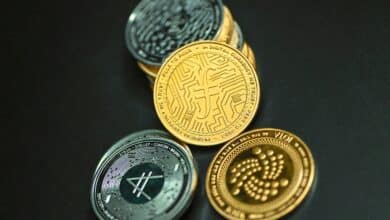
Introduction
Blockchain is a digital ledger that allows users to store data and financial transactions without the presence of centralized supervisors such as banks and financial regulators. The introduction of Bitcoin, the first ever blockchain project took the world by storm when it made its debut in 2009. The introduction of the Bitcoin blockchain introduced the concept of DeFi or Decentralized Finance to the common man. In the 21st century when the power of governance has been transferred to the people rather than kings, the developers are trying to break the monopoly on money using DeFi.
What is Decentralized Finance (DeFi)?
DeFi is a portmanteau of two terms namely Decentralized and Finance. The term was first coined in 2018, during a Telegram messaging thread between some blockchain developers. These developers hailing from Ethereum, Yeo Set Protocol, 0x Blake Henderson, and Brendan Forster from Dharma were exchanging ideas about the open financial applications development on the Ethereum network. Almost everyone in the 21st century manages their money through banks.
Banks operate under the direction of the Central Banking Authority. On the other hand, the money that the people use in any country is under the supervision and control of financial regulators and the government. Only the government has the power to make any changes in the money. However, DeFi is an alternative financial management model that allows every user to conduct financial exchanges outside of the purview of the centralized financial network that is wholly controlled by the state.
What is DeFi Ecosystem?
A DeFi ecosystem is a financial network where the stakeholders can perform financial transactions and other functions without the intervention of any centralized authority. Before blockchain, it was very difficult to create a financial network that was free from the doubt of manipulation. However, the Bitcoin blockchain allowed people to conduct financial transactions without risking any data manipulation. Cryptocurrency exchanges, digital wallets, and peer-to-peer transaction platforms are all part of the DeFi ecosystem.
When a person makes a transaction using their bank accounts, the government maintains the records so that there is no foul play. However, when a person performs a financial transaction using a blockchain network the transaction is recorded on a digital ledger and stored on countless computers around the world acting as a ledger record. It is almost impossible to manipulate or change the recorded data on a blockchain network. All the transactions on a blockchain or cryptocurrency that are recorded on DeFi are under the umbrella of the DeFi ecosystem.
What are the Basic Characteristics of DeFi?
For beginners, it can be a challenge to differentiate between DeFi and TeFi (Traditional Finance) networks. It is worth noting that many cryptocurrency exchange platforms are centralized. Here are some key characteristics of DeFi that will allow the reader to identify it with distinction:
Open Finance
The person of one country cannot use the fiat currency from another region without exchanging it first. However, the great benefit of DeFi is that anyone hailing from any part of the world can use the same currency regardless of their nationality or location. It is not wrong to say that the DeFi ecosystem is borderless and completely void of discrimination. Many blockchain and cryptocurrency organizations allow users to purchase digital assets using their local fiat currencies.
Decentralized
It is important to understand that some blockchains like Hyperledger can be centralized since they are permissioned or private networks. However, a DeFi blockchain is truly decentralized like Bitcoin or Ethereum network. These open-sourced blockchains are not under the control of any private organization or a government entity. Their operating status is public and they are owned by community members.
Non-Custodial
Non-custodial is a quality of a financial network that allows its stakeholders to perform financial transactions without the presence of any centralized intermediary. It is a requirement for every cryptocurrency holder to have a digital wallet account. However, those who wish to have full control over their transaction history, financial exchanges, and data privacy should opt for non-custodial wallets. When a digital wallet is non-custodial, it means that no one other than the person owns their assets.
Transparency
Public blockchains define the DeFi ecosystem. Anyone and everyone on the blockchain can trace all the transactions that are taking place on a DeFi network. DeFi allows people to keep the record of financial transactions unchanged by issuing a copy of every single exchange to every user.
Hackers are unable to change the records present on millions of computer servers. At the same time, it also means that DeFi transactions are completely transparent and they are traceable by everyone on the network regardless of their contribution ratio.
Multiplying
DeFi projects are all about empowering the common man. Therefore, the biggest blockchains are public networks and open-sourced. Any developer from any part of the world is free to copy the code from the blockchain and use it to create a new blockchain project for any other purpose. There is no patent or copyright on the blockchain technology that has been marked as open-sourced. This is the main reason why blockchains can keep multiplying and increasing so rapidly.
Advantages of DeFi
Most people want to put their salaries into a bank account which is the most secure form of money management in the modern world. Therefore, it is common for a person to question why they should try to use a decentralized finance network rather than a bank that is part of the centralized financial machinery. Here are some of the most important advantages that have made the DeFi ecosystem so popular in the last decade:
Margin of Error
Many economists and expert financial market analysts claim that there are many lags in the centralized banking system. Some of the experts also attribute issues like inflation, recession, and economic crisis to the mismanagement of the centralized banking network. Therefore, many people consider blockchains and DeFi a refreshing alternative to third-party intermediaries (TPIs) and central banks. There is a notion that DeFi can improve or upgrade traditional financial networks.
Quick and Irreversible
DeFi is a financial transactions network that is quick and irreversible. Before the introduction of DeFi, a person had to wait for days or months to get a loan application approved by a bank. At the same time, the transactions on the DeFi network are one-sided and irreversible which mimics the security of the traditional banking system. Additionally, DeFi users can access the markets at any time and from any place.
System Strength
The economy based on the centralized banking network is rather fragile as is evident from the several worldwide economic crashes thus far. In case of a sudden war outbreak or a pandemic like COVID, the banking network collapses and the financial lifeline is halted. However, with DeFi everyone can keep performing all sorts of financial functions like money exchange, lending, purchasing, and others regardless of Central banking and government malfunctions.
Permissionless
DeFi is a permissionless financial zone. It means that anyone performing any financial transaction or function within the ecosystem does not require to get the approval of any Central Bank or private financial enterprise. DeFi depends on automation protocols like smart contracts and it allows the users to keep using the financial options as long as they met all the conditions for a transaction. There is no need to submit any sort of documentation or wait for a bank to approve your application in DeFi.
Immutability
Due to the immutability of the PoW and truly decentralized financial networks, it becomes impossible for hackers or any other threat actors to manipulate or change the transaction data. The security protocols on DeFi blockchains like Bitcoin and Ethereum are many times stronger than the centralized banking networks like SWIFT. Therefore, the users can keep making new financial transactions without worrying about any illegal changes in the records.
Transparency
Transparency is one of the most important advantages offered by DeFi networks. Inside a DeFi ecosystem, all community members have equal status. It means that any member of the community can check any transaction record they want. There is no restriction or special authorization needed to track a particular financial transaction and cross-check it or extract further details from it.
Limitations of DeFi
DeFi is often touted as an upgrade or the evolution of the traditional financial infrastructure. However, it is important to note that DeFi also suffers from some minor imperfections. Some of the challenges DeFi is currently facing are listed below:
Scalability
DeFi platforms often suffer from the lack of scalability on them. PoW blockchains take a lot of time for verifying every new block. On the other hand, a blockchain network can suffer from issues like inflation of transaction fees and delays in transaction verification when the trading volume increases. However, developers have come up with upgrades to increase the block size so they can carry more transactions. Another noteworthy solution is the addition of second layers on blockchain to increase their scalability.
Liquidity
DeFi platforms also have to deal with a lack of liquidity on the platform. Some networks allow the cryptocurrency holders to create a Liquidity pool by incentivizing them with yield income. However, users are unable to utilize their pledged cryptocurrencies in the pool for any other usage. At the same time, there is also an issue of over-collateralization due to the lack of liquidity on DeFi.
Lack of Insurance
Early banks suffered from bankruptcy and economic crashes. However, modern banks are covered by Bancassurance which means that in case of any issues, the reserves of the bank account holders are covered and recoverable. Meanwhile, DeFi does not have room for any such insurance coverage and it means that the DeFi account holders have a greater financial risk and they do not have any backup in case of the crash of the DeFi organization.
Security Risks in DeFi
The traditional banking networks took hundreds of years to reach their current position. However, the DeFi network has only been around for a little more than a decade. Therefore, the DeFi network suffers from some major setbacks and risks. Anyone willing to start trading cryptocurrencies should know about some of the most important security risks of DeFi listed:
Liquidity Estimate
Liquidity is the quality of an asset to get quickly exchanged for cash or another asset class. The DeFi sector has always suffered from a lack of liquidity. Therefore, most DeFi networks have multiple liquidity pools. However, it is sometimes impossible for a newer token or cryptocurrency to get enough backers.
Therefore, some DeFi ecosystems are known to falsify or exaggerate their liquidity pool statistics to give fake reassurances to the traders and invite more users to their platforms. Furthermore, a liquidity pool estimates the price of a token based on its composition in the pool rather than external oracles.
Hackers can use this value discrepancy to launch DeFi or Flash loan attacks through the pool duration off-balance. Consequently, the pool can make mistakes in calculations and allow hackers to steal the pool reserves.
Frontrunning Attacks
Frontrunning attack is the type of hack attempt where threat actors focus on stealing the cryptocurrencies or manipulating the digital ledger before it has been verified. The attackers use the Miner Extractable Value to create a new variant of the same transaction with higher gas fees.
Therefore, while the miners are busy going after the faux transaction with a higher reward, the attackers can use this time to solve the original transaction and generate profits. These types of attacks are carried out by automated bots and miners suffer from them rather than network users.
Private Keys
A cryptocurrency trader cannot perform any transaction in the DeFi sector without having a digital wallet account. To keep the digital wallet safe, the manufacturer issues a private and a public key for the owners. To log into the digital wallet, it is necessary to input both private and public keys as a password.
However, since private keys are a string of data there is little chance for a person to remember it like a regular password. The users often end up losing their private key which results in the loss of their DeFi reserves forever.
Financial Scams
DeFi has suffered from the implications of financial scams and Ponzi schemes for a long time. There are some cases where whales hold a massive amount of a DeFi token and increase its price by speculation.
When the price is big enough, these whales sell all their tokens at once resulting in a sudden price crash, this type of scam is called Rug Pull. Meanwhile, there are also Ponzi Schemes in DeFi, where unreliable developers introduced a new token and try to make money by introducing new blood into the sector before pulling out their investments or vanishing eventually.
Lack of Control
One technical bling spot of smart contracts is privilege functions. PFs allow the creator of the smart contract to make changes or recall the functions independently. The creator of a smart contract can also gain full control of the DeFi reserves of the users at any time. It means that scammers can steal money from unsuspecting users.
On the other hand, hackers can also take over the access control and launch privilege functions to steal cryptocurrencies.
51% Attack
51% Attack is a hypothetical scenario where the mining pools can turn into a cartel and gain control of 51% hashrate contribution on the blockchain. With such a massive control on the hashrate contribution, the mining cartel can manipulate the financial records on the blockchain and use cryptocurrencies twice without getting caught by others. 51% Attack can even affect most decentralized blockchains such as Bitcoin.
How to Avoid DeFi Security Risks?
DeFi depends on smart contracts to operate as an autonomous financial network without the intervention of the centralized banking system. However, smart contracts are codes and programming strings. A developer can make some unforeseen errors in the smart contract code.
On the other hand, in some cases, upgrades can create new loopholes in a smart contract. At the same time, hackers are always trying to come up with new techniques to gain control of a smart contract. However, DeFi networks that have a dedicated security team and have spent time performing a technical audit are more likely to be safer in comparison to their competitors.
Conclusion
The DeFi ecosystem is not free from financial and technical risks. At the same time, it offers so many advantages over the TeFi infrastructure. The cryptocurrency investors need to consider all DeFi limitations to find the right solutions and backup plans while using the Decentralized Finance ecosystem.
Tokenhell produces content exposure for over 5,000 crypto companies and you can be one of them too! Contact at info@tokenhell.com if you have any questions. Cryptocurrencies are highly volatile, conduct your own research before making any investment decisions. Some of the posts on this website are guest posts or paid posts that are not written by Tokenhell authors (namely Crypto Cable , Sponsored Articles and Press Release content) and the views expressed in these types of posts do not reflect the views of this website. Tokenhell is not responsible for the content, accuracy, quality, advertising, products or any other content or banners (ad space) posted on the site. Read full terms and conditions / disclaimer.







